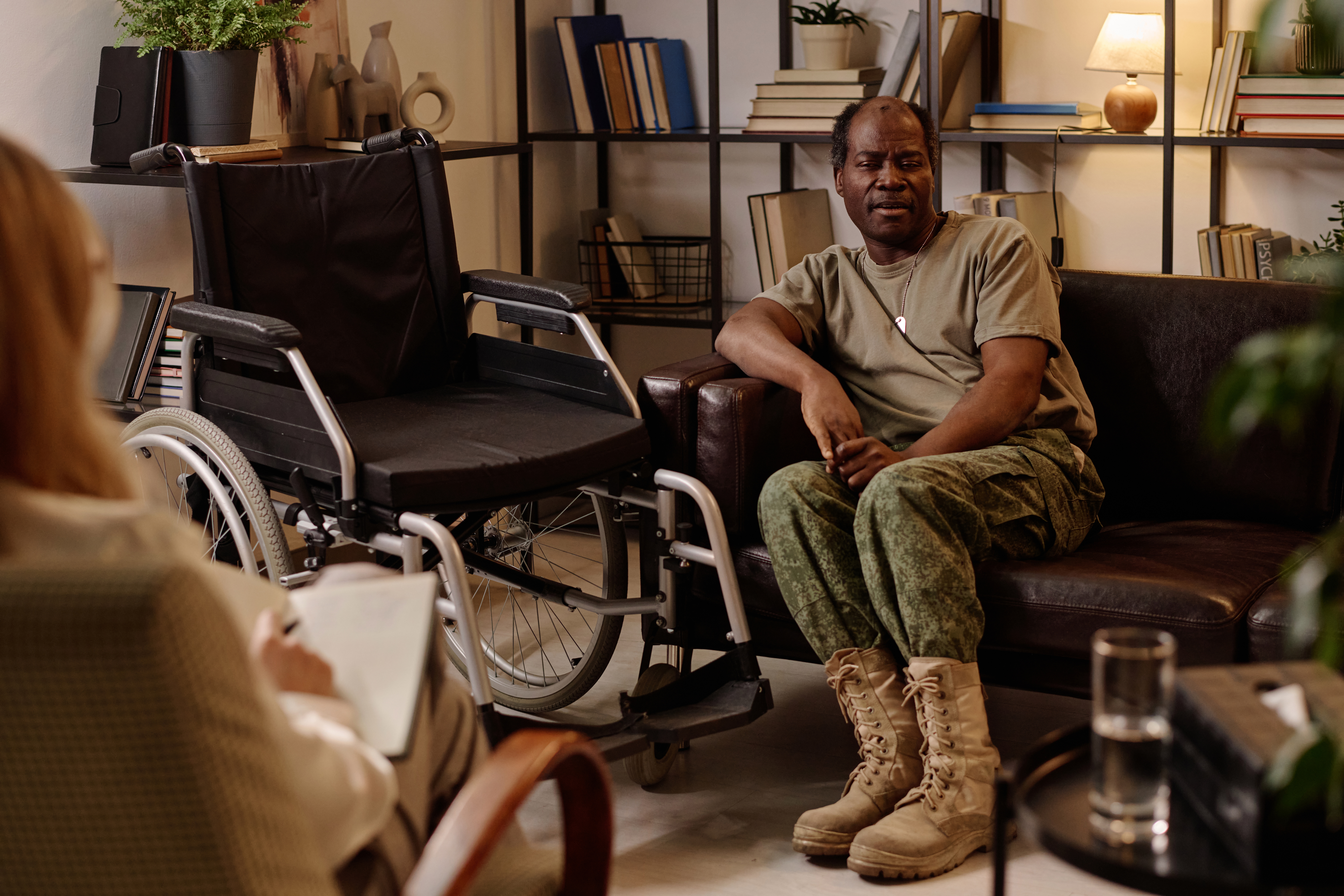Veterans face unique health challenges upon returning to civilian life, with alcohol use disorder (AUD) and sleep apnea being two conditions that frequently impact this population. Studies indicate that over 40% of veterans diagnosed with PTSD also struggle with alcohol use disorder, using alcohol as a coping mechanism for stress, trauma, and sleep issues. Similarly, sleep apnea is prevalent among veterans, often linked to conditions like PTSD and other service-related factors.
The relationship between AUD and sleep apnea can intensify the symptoms of each condition. While AUD presents significant risks to both mental and physical health, sleep apnea severely affects sleep quality, daytime energy, and overall well-being. When these two conditions co-occur, they can create a cycle of worsening health, where poor sleep leads to increased alcohol use, and alcohol use, in turn, exacerbates sleep disturbances. Addressing both conditions holistically is crucial for improving veterans’ quality of life and overall health outcomes.
Understanding Alcohol Use Disorder (AUD) in Veterans
Alcohol Use Disorder (AUD) is a chronic medical condition characterized by an inability to control alcohol use despite its negative effects on a person’s health, work, and relationships. AUD can vary in severity, from mild to severe, and symptoms often include a strong craving for alcohol, an inability to limit drinking, and experiencing withdrawal symptoms when alcohol use is reduced or stopped. This condition is widely recognized as a complex disease influenced by both genetic and environmental factors. Understanding alcoholism in veterans is crucial, as veterans are frequently exposed to conditions that elevate their risk for dependency.
Veterans are at a heightened risk for developing Alcohol Use Disorder (AUD) due to various unique challenges. Factors such as exposure to high-stress environments, the need for coping mechanisms, and the effects of post-traumatic stress disorder (PTSD) can increase vulnerability to alcohol misuse. Combat exposure and other traumatic experiences often lead veterans to use alcohol as a way to self-medicate, attempting to manage feelings of stress, anxiety, or emotional numbness. According to the National Institute on Drug Abuse (NIDA), approximately one in three veterans seeking treatment for substance use disorders report alcohol as their primary substance of misuse, underscoring how prevalent alcohol dependency is among this population. While alcohol may offer temporary relief from intense emotions, it often leads to dependency, compounding mental health issues and resulting in long-term health complications such as liver disease, cognitive decline, and an increased risk of other substance use disorders.
What is Sleep Apnea?
Sleep apnea is a common but serious sleep disorder where breathing repeatedly stops and starts during sleep, disrupting restful sleep and leading to poor quality sleep and daytime fatigue. The most prevalent form, obstructive sleep apnea (OSA), occurs when throat muscles intermittently relax, blocking the airway. Central sleep apnea, less common, happens when the brain fails to send proper signals to the muscles that control breathing.
Symptoms of sleep apnea often include loud snoring, gasping for air, frequent awakenings, excessive daytime sleepiness, morning headaches, and irritability. Veterans are particularly at risk, especially those with post-traumatic stress disorder (PTSD). In fact, a study found that 69.2% of veterans with PTSD screened as high risk for OSA, a significantly higher rate than in the general population. This increased prevalence highlights the importance of screening and treatment, as untreated sleep apnea can lead to serious health issues, including cardiovascular disease, diabetes, and further mental health challenges. For veterans, the compounding effects of sleep apnea can interfere with daily activities, cognitive function, and overall quality of life, especially when coupled with conditions like alcohol use disorder.
The Connection Between Alcohol Use Disorder and Sleep Apnea in Veterans
The relationship between alcohol use disorder (AUD) and sleep apnea is complex and mutually reinforcing, particularly in veterans. Alcohol, when consumed, relaxes the muscles in the throat, which can cause the airways to collapse during sleep, either triggering or worsening existing sleep apnea. Drinking alcohol before bed increases the risk of airway obstruction and often disrupts the natural sleep cycle, reducing overall sleep quality. For veterans who struggle with both AUD and sleep apnea, this interaction creates a cycle where poor sleep quality may lead to increased alcohol consumption as a coping mechanism, further aggravating both conditions.
This link between AUD and sleep apnea among veterans is often tied to underlying conditions such as PTSD, chronic stress, and trauma. Veterans may turn to alcohol as a way to manage PTSD-related symptoms like anxiety, hypervigilance, or nightmares, only to find that alcohol use exacerbates sleep-related issues. According to research, veterans with both sleep apnea and AUD are at increased risk of experiencing insomnia, reduced sleep duration, and other mental health conditions, including depression. This cycle can lead to further mental and physical health complications, making integrated treatment for both AUD and sleep apnea essential for improving veterans’ overall well-being and quality of life.
Health Risks of Alcohol Use Disorder and Sleep Apnea for Veterans
The combination of AUD and sleep apnea can lead to a host of health complications. In the short term, poor sleep and excessive alcohol consumption can lead to fatigue, impaired decision-making, and irritability. Over the long term, veterans with both conditions may face high blood pressure, heart disease, liver disease, cognitive decline, and a weakened immune system. The mental health impact is also significant, with heightened risks of anxiety, depression, and worsened PTSD symptoms.
Seeking Treatment for Alcohol Use Disorder
If you are a veteran or know a veteran struggling with alcohol use disorder, the first step is seeking a professional diagnosis. For AUD, diagnosis involves a series of questions about drinking habits, behaviors, and the impact of alcohol on daily life. Veterans may turn to alcohol as a coping mechanism, but effective treatments can provide healthier ways to manage stress and trauma. For veterans struggling with alcohol use disorder, finding a supportive veteran’s alcohol & drug rehab that understands the unique challenges faced by former service members is essential.
Treatment options for AUD at Tres Vistas Recovery include evidence-based therapies, medication-assisted treatment (MAT), and support groups. Therapy options such as Cognitive Behavioral Therapy (CBT) and trauma-focused therapy are particularly beneficial for veterans, as they address both the emotional and psychological factors tied to alcohol use. Our supportive, compassionate approach helps veterans take meaningful steps toward recovery, fostering resilience and a healthier lifestyle.
How Tres Vistas Recovery Can Help Veterans
At Tres Vistas Recovery, we understand that veterans need compassionate, targeted care to address complex health issues like AUD and sleep apnea. Our outpatient program offers flexible treatment plans that include individual therapy, group sessions, and education on healthy coping mechanisms. We work with sleep specialists to help veterans improve sleep quality while also addressing the underlying causes of alcohol dependency.
Our dual-focused therapy approach means that we don’t just address alcohol use disorder in isolation. We consider co-occurring conditions like sleep apnea, providing resources and therapies to improve both conditions. Through education, counseling, and medical support, Tres Vistas Recovery empowers veterans to reclaim their health and well-being.
Support Systems for Veterans with Alcohol Use Disorder and Sleep Apnea
Peer support can be invaluable in recovery. Veterans who share similar experiences often provide each other with encouragement and understanding that is difficult to find elsewhere. Tres Vistas Recovery offers group sessions where veterans can connect and share their experiences in a safe, supportive environment.
Family support is often essential for recovery, and we encourage family members to be involved in the process. Through family therapy and education, Tres Vistas Recovery helps families understand the challenges their loved ones are facing and equips them with tools to offer meaningful support.
The Path Forward – Seeking Help at Tres Vistas Recovery
Overcoming the dual challenge of alcohol use disorder and sleep apnea is not easy, but with the right support, recovery is possible. Tres Vistas Recovery provides a safe, non-judgmental space for veterans to heal and recover. Our dedicated team is here to support every step of the journey, helping veterans create a healthier, fulfilling future.
If you or someone you know is struggling with alcohol use disorder and sleep apnea, don’t hesitate to reach out. Tres Vistas Recovery offers tailored programs designed to meet the unique needs of veterans. Contact us today to learn how we can help you or your loved one reclaim their health and well-being.














